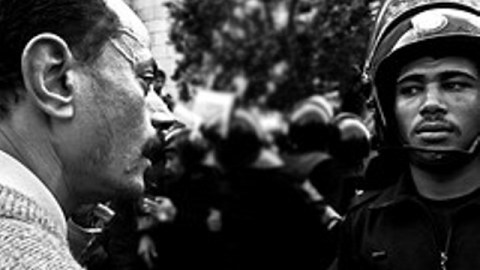Thinking About Our (Internet) Revolution!

When the late Idi Amin launched a successful coup attempt against the then President of Uganda, Milton Obote, he made sure that the latter was attending Commonwealth Conference, before sending key army units to secure the Presidential Palace, and key of course, the radio station. When years later supporters of Obote returned the favour and removed the despotic Amin, they did the same. Military coups in sub Saharan Africa and Central and South America just used to be a whole lot more regular and predictable – but always the radio station was key.
Just watch how the Egyptian authorities have tried to stall the revolution from below. They threw a ring of steel around the key broadcasting outlets, used state run TV to show President Mubarak kissing children and street scenes of mind numbingly unreal, normality. In the old days controlling State media in this way might just have saved the day, especially if protestors began to feel isolated and lose heart.
The explosion of anger across Egypt and the sheer number of people involved has precluded that of course. But isn’t it interesting to learn that the Egyptian authorities began to realise that part of the game was up when they felt the need to control and block the internet and interfere with the mobile phone network. They also felt obliged to move against independent media, most notably Al Jazeera, whose bureau was shut down in quick order. Al Jazeera can be viewed on satellite television, but it can also be viewed on some mobile phones and over the internet.
The actions of the Egyptian authorities mirrored that of the Iranian Government which reacted to widespread public anger on the streets at alleged election tampering last year by attempting to shut down new media and the cell phone networks. All of this just goes to show how vital new media is in the battle for hearts and minds wherever they may be courted.
There is a danger of getting carried away and saying baldly that the Egyptian uprising is an internet revolution. It is nothing of the sort. This is a very real revolution and one where many of the protagonists have learned to use new media to confound the authoritarian state. The point being also that this new media is un-policed, often free and available to all.
As a technophobe, albeit as a not very proud technophobe who is constantly embarrassed by having to call upon my son and daughter to operate DvD machines etc, I am alarmed at what I read about the privatisation of cyber space, and what that could mean in the future for popular action – such as the revolution unfolding before our eyes in Egypt. Perhaps someone out there can help me – especially as ‘Big Think’ in collaboration with Bing is exploring the future of ‘search’ in San Francisco. In the even brave World of a decade’s hence, when Google and the big search engines have been by passed and we have to pay to specialise search, will tomorrow’s revolutionaries in Riyadh have to buy a special ‘Riyadh App’, before they can link up with others?





